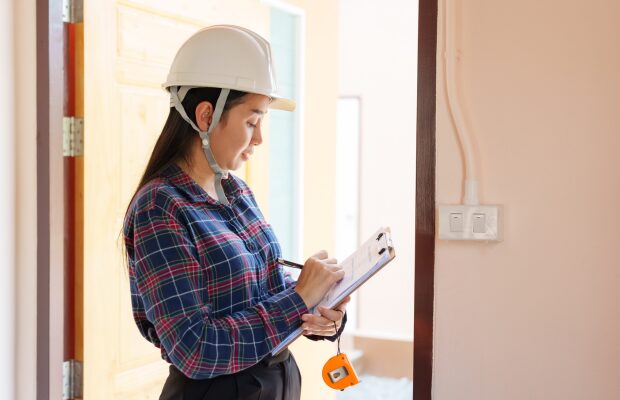Buying a house is a huge investment, so it’s important to find out as much as you can about a property before you buy it.
Asking the right questions on a property viewing can be a great way to get key information that will help you make an informed decision about buying.
“How long the house has been on the market and how long the current sellers have lived there can be great questions to get revealing answers,” says Ellis & Co Managing Director Rob Smith.
“A house that’s been on the market for a while may have a hidden negative or could be a great way of getting a reduced price.
“Also, neighbours can make or break a new a home so remember to ask how they are, as you don’t want to regret your move months later.
“If the current owner has had any issues, they are legally obliged to tell you if you ask.”
In this guide, we reveal the 10 most important questions to ask an estate agent.
And our house viewing checklist explains all the questions you’ll need to ask yourself as you look around what could be your dream home.
What is the first thing to do when viewing a house?
When viewing a house, the first thing you should do is consider your initial impression of the property.
Arrive for your viewing early and spend some time outside the property, considering things like:
- Noise from neighbouring homes
- Traffic on the street
- The condition of the property’s exterior, including the roof
What should I look for when walking through a house?
As you walk through a property during a viewing, you should look out for:
- Signs of damp, including peeling wallpaper, blistered paint, or mould
- Signs of subsidence, including cracks in walls or sagging floors
- Plumbing issues, such as poor water pressure
- Electrical problems, such as exposed wiring or old sockets
- Poor quality windows that could affect energy efficiency
- No central heating
- Fresh decorating that could be concealing a problem
What should you not do when viewing a house?
Don’t become over emotional when on a viewing.
Buying a home is an emotional process, but it’s important to focus on the practicalities of a property when viewing for the first time.
Other things you should avoid on a property viewing include:
- Admitting to the seller’s agent that the property is your dream home
- Disrespecting the property or its décor
- Negotiating on price with the agent
- Bringing along pets
How many times should I view a house before buying?
You should view a property as many times as you feel you need to before committing to buying.
Even in a busy market, with lots of buyer activity, you should view a property at least twice before making an offer.
It’s highly likely you’ll be more emotional about a property on your first viewing, meaning you could miss potential issues.
A second, third, or even fourth viewing gives you the opportunity to:
- Look more closely at the condition of the property
- Consider the practical elements and assess how well it will work for you
- Take other family members or tradespeople along for a second opinion
- View the property and area at different times of the day
- Measure up, so you can be sure your things will fit in the property
Questions to ask when buying a house
There are a whole host of questions you should ask the seller’s estate agent on a viewing, including:
1. Why is the property being sold?
Finding out why the sellers are moving can give you a great idea of how quickly they need to move.
Perhaps they’re moving for work reasons and need to have moved to a new area by a certain date.
Or maybe they’re simply testing the water by putting their home on the market and aren’t in any rush to sell.
Finding out these reasons can give you a great indication of how receptive the sellers may be to an offer.
2. How long has it been on the market?
A property that has been on the market for a long time could either indicate problems or that it’s overpriced.
The sellers may also be more open to a lower offer if they’ve been unable to sell for several months.
3. Have there been any offers?
It’s important to establish how much interest there is in any properties you’re viewing.
If a property has already had offers but these have been rejected, you may face increased competition therefore you may have to pay more to secure it.
Or if a property has had little interest, you may have more time to consider it and attend more viewings without the pressure of knowing other people are interested, too.
4. What work has been done on the property?
Ask your seller’s estate agent about major renovation work that’s been carried out, who completed the work and whether there are any guarantees.
You should also ask about planning permission and whether this was correctly obtained by the seller.
If work was carried out without the required planning consent, this could have a major impact on you if you were to purchase the property.
5. Have the sellers found a new property?
If the sellers of a property you’re interested in are yet to find their next home, this could impact how quickly you’re able to move yourself.
Finding out how long the property chain is likely to be can help you decide if the property is right for you.
6. How many times has the property been sold?
A property with lots of different owners in a short space of time could be a red flag.
Lots of owners could indicate a problem with the property, the neighbours, or the area.
Ask the estate agent how long the current owners have lived in the property and try to find out about the length of time previous owners spent there.
7. What’s included in the sale?
Even on a first viewing, it can be helpful to get an idea what else will come with the sale of the property.
Will all fixtures and fittings be staying? Will the sellers be taking the garden shed or greenhouse with them when they move?
8. Does the property have fibre internet access?
Connectivity has never been more important, so find out more about broadband speeds at the property you’re viewing.
Rural homes sometimes suffer from slower speeds, due to copper rather than fibre optic cables, so ask the agent about this if you require super-fast connection.
9. Is the boiler fully serviced and how old is it?
Boilers can be among the costliest appliances to replace, so try to find out how often the boiler in the property you’re viewing has been serviced.
An old boiler may also be cause for concern, so ask the agent about the age of the property’s heating and hot water systems, too.
10. Have there been any issues with the neighbours?
Sellers are legally obliged to highlight any disputes with neighbours if asked, so be sure to ask the agent if there have been any issues.
Your complete house viewing checklist
There are lots of things you’ll need to consider when viewing a property to buy
and this checklist can help:
1. Property exterior
- What is the property’s general exterior condition like?
- Are there any major cracks in brickwork, pointing, or render?
- What condition is the render in?
- Are there any missing or cracked tiles on the roof?
- Are the chimney’s solid and straight?
- What condition are the guttering and downpipes in?
- Do the facias look in good condition?
- Are the windows wooden or uPVC and what condition are they in?
- What condition is the garden in?
- Does the garden work as a useable space?
- Is the garden overlooked by neighbouring properties?
- Are there large trees in the garden or in neighbouring properties?
- Are there any signs of invasive plants, such as Japanese Knotweed?
2. In each room
- Are light fittings and switches in good condition and do they all work?
- How is each room’s general décor?
- What condition are carpets and hard flooring in?
- Are there any signs of damp or mould?
- Do the walls have any large cracks?
- Does each room have enough storage?
- Can neighbouring homes have direct line of sight into the property?
- Do windows and doors open and close correctly?
- Are the windows double glazed and in good condition?
- Do the radiators work?
- Are there enough plug sockets?
3. Bathrooms and plumbing
- Do the taps work and the basins/sinks drain?
- How is the water pressure?
- Do the hot water taps heat up sufficiently?
- Do the toilets flush and refill properly?
4. Kitchen
- What fixtures, fittings, and appliances come with the property when it’s sold?
- Are the cupboards and drawers in good condition and do they open/close?
- Do the taps work and does the sink drain?
- Do built-in appliances all work correctly?
- Does the kitchen have enough storage?
- Is there enough worktop space for preparing food?
5. Living room
- How much natural light does the living room get?
- Does it feel warm and inviting?
- Are the walls or ceiling textured?
- Does the fireplace work?
- Is there enough room for your furnishings?
- Is there space for a television?
6. Bedrooms
- Is there enough space for a large bed?
- Is there any built-in storage?
- Is the room large enough for a wardrobe and chest of drawers?
- Are the curtains or blinds included with the property?
7. General questions
- Does the property come with off-road parking?
- Does it have functioning burglar and fire alarms?
- Is the mobile phone coverage good inside and outside?
- Does the property have development potential?
- Is the loft accessible and can it be used for storage?
- Is the property in a conservation area or is it a listed building?
- What is the property’s Energy Performance Certificate (EPC) rating?
- How busy is the road outside during rush hour and at weekends?
- How good are transport links nearby?
- Is the property close to amenities like shops?
- How good are the schools in the catchment area?
8. Questions when buying flat
- Is the flat leasehold or part of a shared freehold
- How many years are left on the lease?
- Could the number of years left on the lease affect your chances of getting a mortgage?
- How much is the annual service charge?
- Is a ground rent payable and how much is it?
- Who is responsible for communal areas?
- Does the property come with a parking space?
- Can you hear noise from neighbouring flats?








